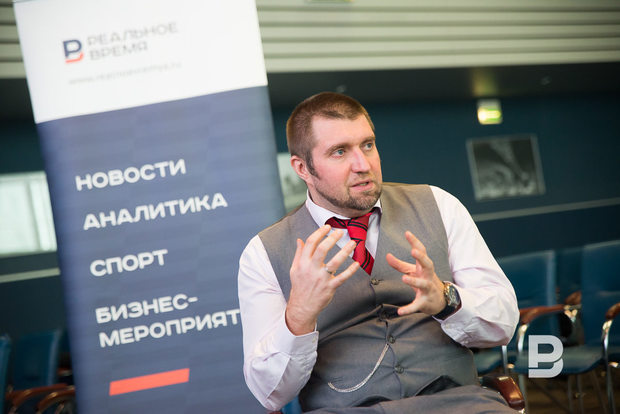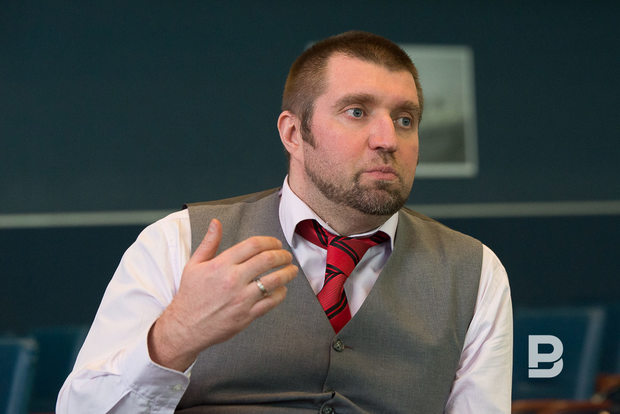Dmitry Potapenko: ‘In Tatarstan the entrepreneurs are treated amazingly: they are not ‘pushed’’
The scandalous retail expert about the feudal lords and Tatarstan authorities loyal to the business
On 13 April, the well-known businessperson and expert, ex-head of retail network Pyaterochka Dmitry Potapenko arrived in Kazan with his Anti-crisis Tour. In the framework of the visit to the capital of Tatarstan, he met with the correspondent of Realnoe Vremya and in the exclusive interview spoke about his offshore businesses, the feudal lords in the country and his participation in the life of a political Party Rosta of the business ombudsman Boris Titov.
An offshore company – the protection of property
Dmitry, how has the scandal over offshore companies in Panama, in your opinion, influenced the Russian elite?
'Panama' is a sacred thing. Honestly, the scandal was not so big. Is it really scandal? In my understanding, a lot of discussed is secondary. Evidence base. I have looked at many documents. There is very a little evidence — well, technologically. 'Panama' has showed the main thing: our government doesn't believe themselves. It is, in my understanding, the alpha and the omega. They are at their work, having 'backing' in the higher echelons, withdrew and will continue withdraw money because they do not believe themselves. This is awesome!
However, it's not a secret for me, I knew it from Cyprus, when there it began to disclose. So, we have no scandal, it's quiet, calm. Moreover, most population do not condemn it so strong.
Why does the country need offshore companies in general?
An offshore company is a common jurisdiction, it is not bad and not good. This jurisdiction allows protecting property rights. In 80% of cases an offshore company is the protection of property rights, at least for Russia. Abroad, the fundamental difference – it's some kind of tax optimization. But ours use it not so much for tax optimization – it is only 20% — but for the protection of property rights, in order it wouldn't be taken away.
Why does offshore jurisdictions exist? It's very simple: globalization. You have two options. Those countries that we, conditionally speaking, call offshore companies may become very poor because they have no economy. This is absolutely a deliberate policy of all countries. They understand that, on the one hand, they make some of the Islands without offshore companies, but businesses will not be there. They will have to support them from the point of view of poverty. The banditry will flourish there. Somalia is a future offshore, in fact. Why should the second, tenth, twentieth conditional Somalia exist? The second option: they make offshore of them, the country attracts money and earn some penny, and all other countries don't have to support them. That's why there are offshores as jurisdiction.
It is not about the country. It's about the safety of people with money who understand that when they have money and power they are not the power. Because there is another power.

About offshore companies: 'Abroad, the fundamental difference – it's some kind of tax optimization. But ours use it not so much for tax optimization – it is only 20% — but for the protection of property rights, in order it wouldn't be taken away.'
And you, Dmitry, what tools have you used?
Of course, as a company, we use it to ensure ownership rights. Because the injustness and the lack of a fair trial push out. Where there is some property complex, you have to do it abroad.
A light version of North Korea
Last year at the Moscow Economic Forum you made an angry accusing speech. Did this speech have positive or negative implications for you or your business?
They, of course, shook my hand, for what I am thankful. But the raids on us didn't stop. The thing is, if you look what was the clash, it was like: 'Hell, have you gone nuts, always humping in all holes?' I have seen it not from the movies, have not read it from a cup of tea. It turns out that even in this audience all that is being discussed have very much endured and with battered skin interest, unfortunately, what I wish I haven't had. I wish I hadn't a lot of this and knew it only from books. Only there is no such books…
Once you compared Russia with a feudal state…
I still do it.
How do you think, maybe feudalism is natural for our country? Perhaps, we shouldn't take any effort to overcome this Middle Ages?
I can't call it natural for the country. In fact, feudalism is over in many countries. It seems to me that feudalism never produced any economic breakthrough. Definitely, feudal lords are interested in feudalism, and, in general, they retain it the last 25 years, reasonably and correctly. It all depends on what you want to achieve as a result.
You also compared Russia with North Korea...
Well, a light version of it. We are still not North Korea. I've always said it is a light version, it always takes place.
Can we become North Korea?
No. Nobody will benefit from that. The feudal lords won't benefit. We will continue to be a light version.
'I am so far from politics that locomotives and drivers – are just not for me'
You have recently joined the Right Cause political party, which is now called the Party of Growth. Who would you call the conditional locomotives of the party besides you or the business ombudsman Boris Titov? Who of charismatic leaders could promote it?
As for the political deeds, it's not my area. I just do not follow it. I am so far from politics that locomotives and drivers – are just not for me. I was invited by Boris Titov. He says like: 'Dima, here is a piece...' In fact, for me, nothing has changed fundamentally. I was engaged in small and medium enterprises before through such meetings, through other mechanisms – legal, accounting support. And now there is a mechanism called 'party'. Now I have some associates, some sort of support in the regions, of a larger scale. And who's the driver… I don't know everyone here, to be honest. I know no one except Boris.

About the Party of Growth: 'I was engaged in small and medium enterprises before through such meetings, through other mechanisms – legal, accounting support. And now there is a mechanism called 'party'.'
I don't even keep track of this bullshit, to be honest. I join somewhere. But I don't even remember my position, sorry. I remember I am in General Council or in some Political Council. See, to me, the work has not changed for me in any way. I worked with small and medium businesses — and I'm still working with it. And this crown on the head, these logos — in order to attract attention. This is from my Komsomol youth: it is always important what you do, not your job title.
'It is quite good, it may seem odd, the business climate'
You have already visited Kazan several times. In your opinion, have anything changed in the Republic in recent years from an economic point of view?
The situation is not improving, that I can say. There is a decline in purchasing demand. The purchasing demand is falling gallopingly. What we are witnessing in the regions, in Tatarstan: the demand just sits on a… smoothly, and the number of customers is reducing. This is especially true for villages, towns, urban-type settlements with populations of 20 000 or 25 000, everything is tough now there.
Unfortunately, the Republic does not stand out in this respect. It is quite good, it may seem odd, the business climate. I often see a rather loyal attitude of the authorities, which is quite surprising. You always wait for a kick from the authority, but here the entrepreneurs are treated amazingly, they are not 'pushed'. It is quite a schizophrenic idea when we are 'pushed', and we already treat it as 'good'. Unfortunately, the market is falling.
Reference
Dmitry Potapenko – the managing partner of Management Development Group Inc; a business coach. The ex-director of the retail network Pyaterochka, Karusel, etc.